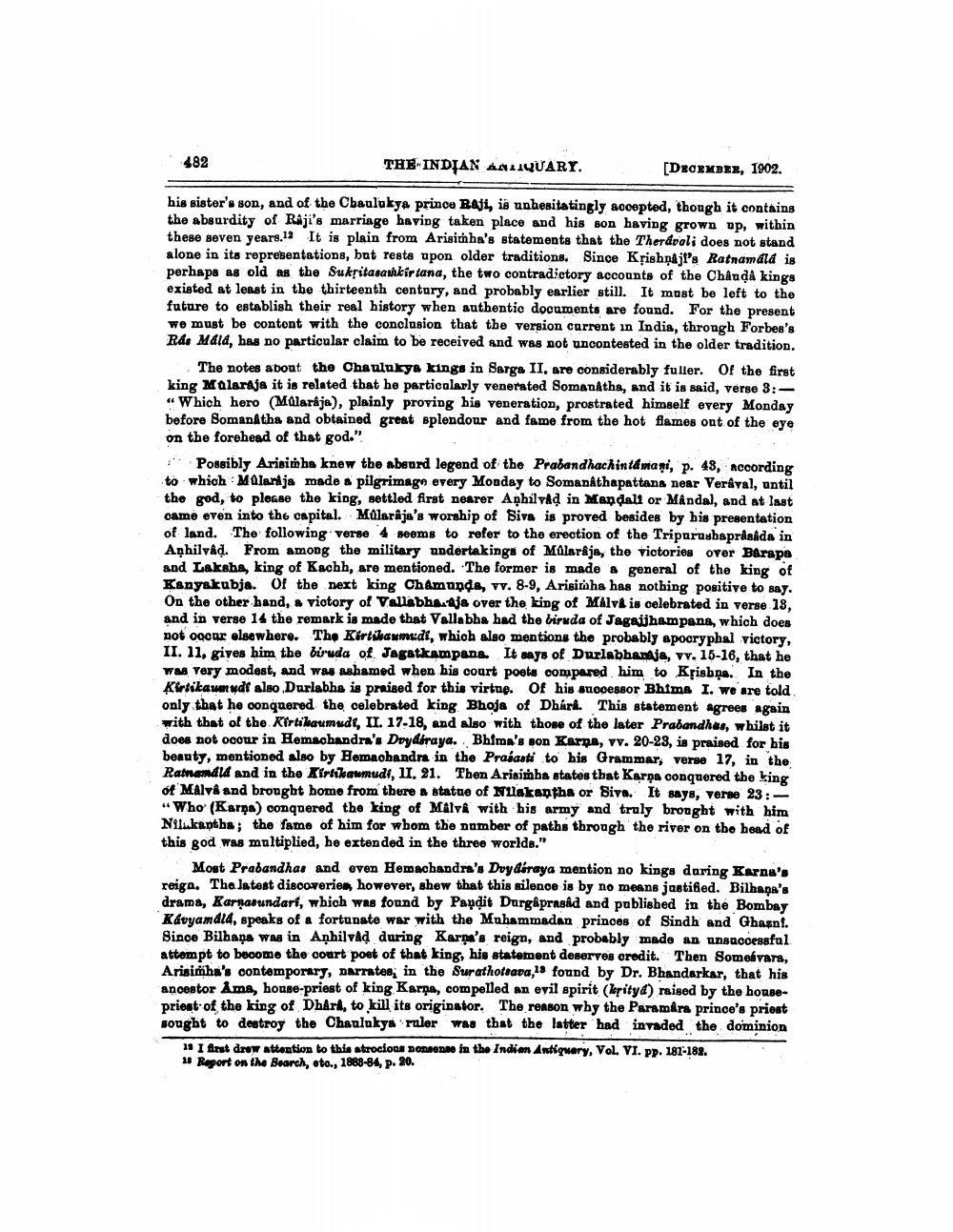________________
482
THE INDIAN ANTIQUARY.
[DECEMBER, 1902.
his sister's son, and of the Cbaulukya prince Beji, is unhesitatingly accepted, though it contains the absurdity of Raji's marriage having taken place and his son having grown up, within these seven years. It is plain from Arisimha's statements that the Therdvoli does not stand alone in its representations, but rests upon older traditions. Since Krishna's Ratnamáld is perhaps as old as the Suksitasankirtana, the two contradictory accounts of the Châudd kings existed at least in the thirteenth century, and probably earlier still. It must be left to the future to establish their real history when authentic documents are found. For the present we must be content with the conclusion that the version current in India, throngh Forbes's Rås Mald, has no particular claim to be received and was not uncontested in the older tradition.
The notes about the Chaulukya kings in Sargs II, are considerably fuller. Of the first king Malaraja it is related that he particularly venerated Somanaths, and it is said, verse 3:" Which hero (Mularaja), plainly proving his veneration, prostrated himself every Monday before Somanaths and obtained great splendour and fame from the hot flames out of the eye on the forehead of that god."
Possibly Arisimha knew the absurd legend of the Prabandhachintamani, p. 43, according to which Malarija made a pilgrimage every Monday to Somanathapattana near Verával, until the god, to please the king, settled first nearer Ambilved in Mandalt or Mandal, and at last came even into the capital. Malaraja's worship of Siva is proved besides by his presentation of land. The following verse 4 seems to refer to the erection of the Tripurushaprasada in Anhilvåd. From among the military undertakings of Mälaraja, the victories over Barapa and Laksha, king of Kachh, are mentioned. The former is made a general of the king of Kanyakubja. Of the next king Chamande, vy. 8-9, Arisimha has nothing positive to say. On the other hand, a victory of Vallabha ja over the king of Malvi is celebrated in verse 18, and in verse 14 the remark is made that Vallabha had the biruda of Jagaijhampana, which does not oocar elsewhere. The Kirtilaumudi, which also mentions the probably apocryphal victory, II. 11, gives him the biruda of Jagatkampane. It says of Durlabhanja, vv. 15-16, that he was very modest, and was ashamed when his court poets compared him to Krisbņa. In the Kirtikawa wdf also Durlabha is praised for this virtue. Of his successor Bhima I. we are told only that he conquered the celebrated king, Bhoja of Dhárl. This statement agrees again with that of the Kirtilaumudi, II. 17-18, and also with those of the later Prabandhas, whilst it does not ocour in Hemachandra's Duydiraya. Bhima's son Karpa, vv. 20-23, is praised for his beauty, mentioned also by Homachandra in the Prasasti to his Grammar, verse 17, in the Ratnamdid and in the Kirtikaumudi, II. 21. Then Arisimha states that Karpa conquered the king of MÁlva and brongbt home from there a statue of Nuskantha or Siva. It says, verse 23:" Who (Karna) conquered the king of Malve with his army and truly brought with him Nilukepths; the fame of him for whom the number of paths through the river on the head of this god was multiplied, be extended in the three worlds."
Most Prabandhas and even Hemachandra's Dvydóraya mention no kings during Karna's reiga. The latest discoveries, however, show that this silence is by no means justified. Bilhada's drama, Karnasundarf, which was found by Papļit Durgaprasad and published in the Bombay Kávyamdid, speaks of a fortunate war with the Muhammadan princes of Sindh and Ghazn. Since Bilhana was in Anhilvåd during Karna's reign, and probably made an unsuccessful attempt to become the court poet of that king, his statement deserves oredit. Then Somesvara, Arisimhs's contemporary, Darrates, in the Surathottava, 18 found by Dr. Bhandarkar, that his ancestor Ama, house-priest of king Karna, compelled an evil spirit (krityd) raised by the housepriest of the king of Dhåri, to kill its originator. The reason why the Paramira prince's priest sought to destroy the Chaulukys ruler was that the latter had invaded the dominion
11 I Arut drow attention to this atrocious Dondente in the Indian Antiquary, Vol. VI. pp. 181-189. 1 Report on the Bearch, oto., 1888-84, p. 30.




